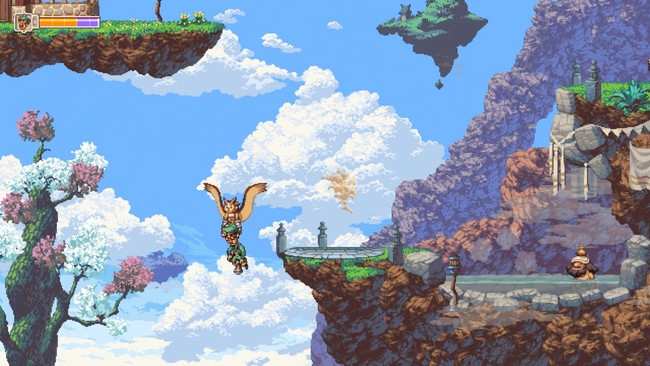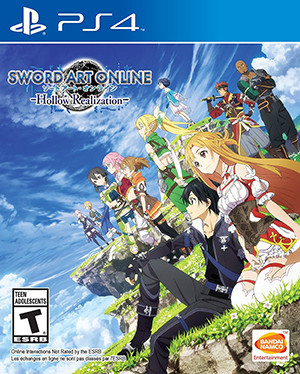This Week in Games
Owlboy
by Dustin Bailey & Zac Bertschy,
One of the weirder things about the move—and one which probably matters only to me—is that when I packed, the Wii U was in my entertainment center alongside my PS4 and Xbox One. When I unpack, it'll be arrayed alongside a line of legacy consoles, doomed for dust collection and ready for replacement by the Switch.
We've got conflicting reports on the status of Wii U production (which we'll get to in news), but one thing's for sure: the life of Nintendo's latest home console is over. A tiny handful of ports are still coming, and Breath of the Wild will have a dual release along with the Switch, but the system is all but done for. Let's take a moment of silence.
I'll have more to say about the Wii U and its legacy next week, but for now, there are some things to be said about Owlboy.
REVIEW: OWLBOY
By Zac Bertschy
Owlboy is billed as an open-world action-adventure rendered in “hi-bit graphics”, a “love letter” to its listed inspirations (Zelda, Metroid, Castlevania: Symphony of the Night, to name only a few Japanese games namedropped in the Owlboy PR that are also listed among the influences for just about every game that looks even a little bit like Owlboy). On at least a couple of those points, Owlboy soars – this game took 9 years to make and every single second of that near-decade is visible right on screen, from the deeply-felt, surprisingly emotional narrative to the painstakingly detailed sprite graphics that look like they were ripped right out of your imagination. There's no denying this is a passion project from top to bottom – the game is run through with that passion, and as a result, Owlboy is spectacular to watch, and the good news is it's also (mostly) a joy to play through.

That said, I was a little surprised at how relatively sparse the environments were – there are pastoral floating islands, ice caves, jungle caves, industrial pirate ship dungeons, eventually a floating castle and that's about it. 2/3rds of the game feels like it's spent in caves or pirate ships, which is a bit of a letdown – Owlboy is capable of beautiful, colorful and unique abstract visuals, but those visuals only really show up at the outset and the finale, during a few major story moments and inside dream sequences. The engine they built to showcase the “hi-bit graphics” can zoom out and show you breathtaking vistas, but they only do that a scant handful of times. The rest of the game doesn't look bad at all – it's just uninspired compared to the artistic heights the game is clearly capable of achieving, and ultimately they wind up leaning on the uninspired stuff a little too much to fill space in between story moments. On your second hour inside your third pirate ship dungeon with wood floors and metal walls you start to forget about floating past misty islands in the sky, backlit by a tangerine sunset.

Otus himself doesn't have an attack beyond a little spin move that doesn't do much damage – instead you're carrying your friends around, cycling through buddies with different combat and traversal abilities with the shoulder buttons as the moment calls. You start out with one friend – Geddy, who's just Jean from Nadia: The Secret of Blue Water with a goatee. He has a gun, and you control this duo like a twin-stick shooter, drifting away from your enemies with the left stick and aiming with the right. You have a dash move, and eventually you get another companion with a shotgun attack with a short charge. This works out great most of the time, especially when the game gives you enough room to really fly around and get creative. However, given Owlboy’s often claustrophobic environments, this control scheme can sometimes become controller-throwingly frustrating. Otus gets a third and final friend late in the game with an ability that maps two different functions to the same button – when you tap the right trigger, he shoots, and when you hold it down, it gives you an aiming reticule for a traversal move that zaps you across the screen. What that means is that in the middle of a frantic firefight, you're accidentally smashing into your enemies over and over again, teleporting yourself to the middle of an attack, or putting yourself on the wrong side of the screen. It's a fun game, and roughly 70 percent of the time Owlboy’s two big gimmicks – flight and hauling your friends around to do your fighting for you – work perfectly fine, but there are boss fights and dungeon crawls that are made dramatically more frustrating and tedious by the imprecise and sometimes poorly-considered controls.

At $25, you're getting about 10 hours or so of videogame here with at least a little replay value – there are secrets I didn't uncover and a sidequest I didn't finish, and I'm sure there are a few things I never wound up seeing. That price seems fair to me – after all, there are a ton of retro-style platformers out there that make the same promises this one does. They immerse you in the way games from the 20th century looked and felt, as if trying to recreate sensations you remember, frequently with no other goal and usually with mixed results – they're just sitting you down in front of some pixel art and asking you to open your wallet. Owlboy is much grander than that – though the game's foibles may mean it never fully coalesces into something that truly transcendent, the experience is memorable, deeply felt, gorgeous, and most of all, fun. Highly recommended.
NEWS
THE WII U IS DONE FOR, EXCEPT IT'S NOT (BUT IT PROBABLY IS)
With Nintendo set to publish only a single upcoming game for the console—one which will have a simultaneous release on the Switch—it's safe to say that time is up for the Wii U. It's a console that had great games, but bad sales, and the ultimate pulling of the plug is basically inevitable. Eurogamer is reporting that the final console will roll off the production line on Friday, leaving lifetime sales of the console under 14 million. For comparison, the PS4 has sold over 47 million so far, and the Wii sold over 101 million.

Kotaku let us know that a Nintendo rep is denying the report, saying that production is scheduled to continue. Earlier this year, a report from Japanese business paper Nikkei suggested that production would be ending, but that turned out false. Of course, Nintendo also has a history of straight-up lying when these reports come out. Another Nikkei report in 2012 suggested that the 3DS would be getting a larger edition, a report Nintendo would deny all the way up until the announcement of the 3DS XL.
ANIMAL CROSSING: NEW LEAF GETS AMIIBO SUPPORT, HAAAAAAARV
Animal Crossing: New Leaf is integrating amiibo support. Specific amiibo cards will cause certain villagers to show up in town, staying for a while inside of a not entirely un-creepy van, ready to move into town if you request. Proper amiibo figures will let you play a few unique minigames and shop for special items.

The update also includes a new survival mode, daily goals for a new currency that you can trade in, a secret storeroom, a save data link with Happy Home Designer, and… Okay, look. These features are cool and all, but I had my fill of New Leaf when I first played it years ago. The reason I'm writing this up is because you should really watch the Nintendo Direct that revealed all this stuff. As the above image indicates it's, uh… it's something else.
HERE'S WHAT PS4 PRO SUPPORT LOOKS LIKE
The PS4 Pro launches in a week, replacing the previous console at a $399 price point and promising a higher-fidelity visual experience across a variety of games, many of which will be updated alongside the new console's release. Upcoming titles are expected to support the Pro out of the box. One such title is Horizon: Zero Dawn, and the features it will sport on PS4 Pro offer a good look at what the console will actually mean for players going forward.

Horizon is able to run at a higher resolution on the Pro, either downsampling to 1080p for sharper images on standard displays, or offering a 2160p checkerboard on 4k displays—not quite as good as actual native 4k resolution, but still visually impressive. There will also be improved shadows and texture filtering. If you have an HDR display, you can expect Horizon to take advantage of the increased contrast and color range.
No word on improved or more consistent framerates, but that'll be up in the air until the game is done. Still, it's telling that so many developers seem to be focusing on improved fidelity rather than improved performance when discussing their Pro patches.
NEXT WEEK'S RELEASES
HARVEST MOON: SKYTREE VILLAGE Developer: Natsume
Developer: Natsume Publisher: Natsume Platform: Nintendo 3DS Release Date: November 8 MSRP: $29.99 Dust off those Ushi No Tane bookmarks, because Harvest Moon is back! Sort of. See, Marvelous had this whole deal where they left the name with Natsume, so the actual series is now called Story of Seasons, but since Natsume still has the name they're making their own Harvest Moon games, and… Look. It's a farm-sim RPG, so it's cause to be excited. Well, maybe. The last Natsume-developed Harvest Moon title, the Lost Valley, reviewed very badly, and Skytree Village is built on those same basics. I hope this one turns it around, because a three-way race for farming RPG greatness between this, Story of Seasons, and Stardew Valley would do my heart good, but I'm not holding my breath.
|
SWORD ART ONLINE: HOLLOW REALIZATION Developer: Aquria
Developer: Aquria Publisher: Bandai Namco Platform: PlayStation 4 / PlayStation Vita Release Date: November 8 MSRP: $59.99 Sword Art Online is a light novel series that got adapted into an anime and then a series of games about a VRMMORPG. The games, then, are games about playing a game. Multimedia anime branding hasn't been this confusing since .hack. The fourth game in the series, Hollow Realization appropriately has you in control of a party of four this time around, blending the action and traditional role-playing elements of previous franchise entries. The main character is a 14-year-old called Premiere, who is currently on Twitter, holding conversations in Japanese that will eventually dictate her in-game personality. These conversations will determine whether she turns into a “good girl” or a “bad girl.” If you've used Twitter, you already know which one it'll be.
|
This week sees the release of Call of Duty: Infinite Warfare, which casual fans seem to be abandoning in favor of Battlefield 1 while critical eyes turn toward Titanfall 2. I'm curious to see how the whole sci-fi theme turns out for the venerable shooter franchise. Meanwhile, Nintendo's putting out another Mario Party in the form of Star Rush for the 3DS, which helps to cement the series' place alongside CoD as one of the most overplayed franchises in the industry.
That's all for this week, so I'll see you next time around. Take a bit of time this weekend to play your favorite Wii U game—if you happen to have one—and we'll pour one out together next week for Nintendo's grand failure.
discuss this in the forum (21 posts) |